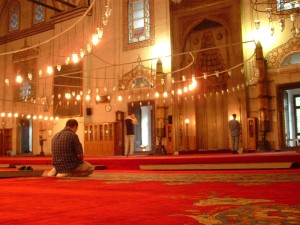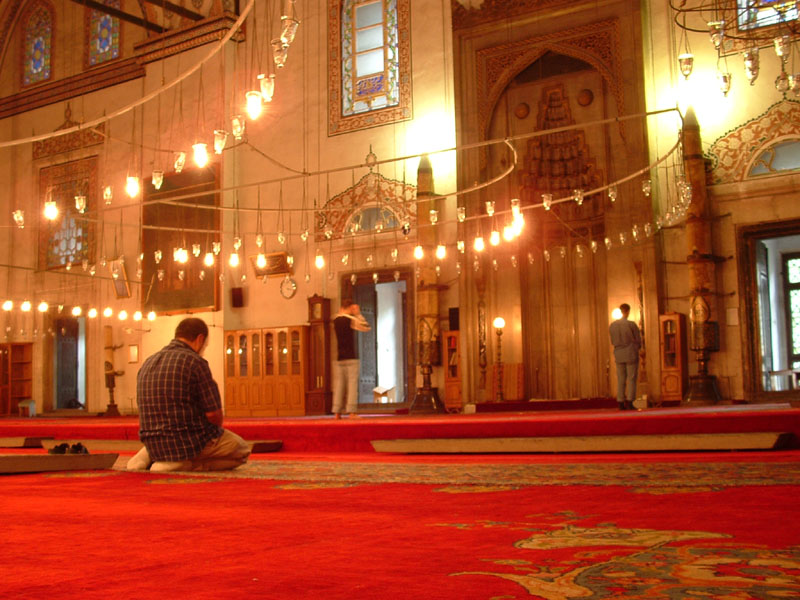
The English term ‘worship’ comes from the Old English weorthscipe meaning ‘honor.’ Consequently, worship in the English language is defined as ‘the performance of devotional acts in honor of a deity.’ According to this meaning, man is instructed to show gratitude to God by glorifying Him. In the Qur’an, God says:
Glorify the praises of your Lord… (Al-Hijr 15:98)
In glorifying God, man chooses to be in harmony with the rest of creation which naturally glorifies its Creator. God addresses this phenomenon in many chapters of the Quran. For example, in the Qur’an, God states:
The seven heavens and the earth and whatever is in them glorify Him and there is nothing which does not glorify His praise. However, you do not understand their glorification. (Al-Israa’ 17:44)
However, in Arabic, the language of the final revelation, worship is called `ibadah, which is closely related to the noun `abd, meaning ‘a slave.’ A slave is one who is expected to do whatever his master wills. Consequently, worship, according to the final revelation, means ‘obedient submission to the will of God.’ This was the essence of the message of all the prophets sent by God to mankind. For example, this understanding of worship was emphatically expressed by Prophet Jesus (the Messiah or Jesus Christ), “None of those who call me ‘Lord’ will enter the kingdom of God, but only the one who does the will of my Father in heaven.”
It should be noted that ‘will’ in this quote means ‘what God wants human beings to do’ and not ‘what God permits humans to do,’ because nothing happens in creation without the will (permission) of God. The ‘Will of God’ is contained in the divinely revealed laws which the prophets taught their followers. Consequently, obedience to divine law is the foundation of worship. In this sense, glorification also becomes worship when humans choose to obey God’s instructions regarding His glorification.
The Need for Worship
Why do human beings need to worship and glorify God by obeying the divinely revealed laws? This is because obedience to divine law is the key to success in this life and the next. The first human beings, Adam and Eve, were created in paradise and later expelled from paradise for disobeying the divine law. The only way for human beings to return to paradise is by obedience to the law. Prophet Jesus, was reported in the Gospel according to Matthew to have made obedience to the divine laws the key to paradise: Now behold, one came and said to him, “Good teacher, what good thing shall I do that I may have eternal life?” So he said to him, “Why do you call me good? No one is good but One, that is, God. But if you want to enter into life, keep the commandments.”
Also Prophet Jesus was reported to have insisted on strict obedience to the commandments, saying: “Whoever therefore breaks one of the least of these commandments, and teaches men so, shall be called least in the kingdom of heaven; but whoever does and teaches them, he shall be called great in the kingdom of heaven.”
Divine laws represent guidance for humankind in all walks of life. They define right and wrong for them and offer human beings a complete system governing all of their affairs. The Creator alone knows best what is beneficial for His creation and what is not. The divine laws command and prohibit various acts and substances to protect the human spirit, the human body and human society from harm. In order for human beings to fulfill their potential by living righteous lives, they need to worship God through obedience to His commandments.

Conditions of the Acceptance of Worship
In the Islamic system, each and every human act can be transformed into an act of worship. In fact, God commands the believers to dedicate their whole lives to Him. In the Qur’an, God says:
Say: ‘Surely my prayer, my sacrifice, my living and my dying are for God, the Lord of all the worlds.’ (Al-An`am 6:162)
However, for that dedication to be acceptable to God, each act must fulfill two basic conditions:
First: The act must be done sincerely for the pleasure of God and not for the recognition and praise of human beings. The believer also has to be conscious of God while doing the deed to insure that it is not something forbidden by God or the last Messenger, may the mercy and blessings of God be upon him.
In order to facilitate this transformation of mundane deeds into worship, God instructed the last Prophet (peace be upon him), to prescribe short supplications to be said before even the simplest of acts. The shortest supplication which may be used for any circumstance is: Bismillah (In the name of God). There are, however, many other supplications prescribed for specific occasions. For example, whenever a new piece of clothing is worn, the Prophet (peace be upon him), taught his followers to say: “O God, thanks is due to You, for it is You who has clothed me. I ask You for its benefit and the benefit for which it was made, and seek refuge in You from its evil and the evil for which it was made.” (An-Nasa’i)
Second: The act must be done in accordance with the prophetic way, called in Arabic the Sunnah. All of the prophets instructed their followers to follow their way because they were guided by God. What they taught were divinely revealed truths, and only those who followed their way and accepted the truths would inherit eternal life in paradise. It is in this context that Prophet Jesus, may the peace and blessings of God be upon him, was reported in the Gospel according to John 14:6, as saying: “I am the way, the truth, and the life: no man cometh unto the Father, but by me.”
Similarly, `Abdullah ibn Mas`ud related, “One day Prophet Muhammad, drew a line in the sand for them and said, “This is God’s path.” He then drew several lines [branching off] to the right and to the left and said, “These are the paths [of misguidance] on each of which is a devil inviting people to follow it.” He then recited the verse: ‘Verily, this is my path, leading straight, so follow it. And do not follow the [other] paths for they will scatter you about from God’s path. That is His command to you in order that you may be conscious of God.’” (Ahmad)
Thus, the only acceptable way to worship God is according to the way of the prophets. That being the case, innovation in religious affairs would be considered by God among the worst of all evils. Prophet Muhammad, was reported to have said, “The worst of all affairs is innovation in religion, for every religious innovation is a cursed, misleading innovation leading to the hellfire.” (An-Nasa’i)
Innovation in the religion is forbidden and unacceptable to God. The Prophet was also reported by his wife, `A’ishah, to have said: “He who innovates something in our religion, that is not of it, will have it rejected.” (Al-Bukhari)
It is fundamentally due to innovations that the messages of the earlier prophets were distorted and the many false religions in existence today evolved. The general rule to follow in order to avoid innovation in religion is that all forms of worship are prohibited, except those which have been specifically prescribed by God and conveyed to humans by the true messengers of God.
ــــــــــــــــــــــــــــــــــــــــــــــــــــ
Source: Taken from the author’s The Purpose of Creation.https://cmenfog.com/sample-page/



